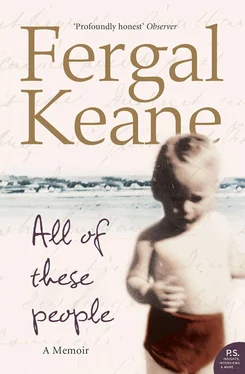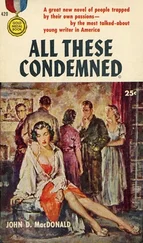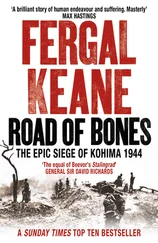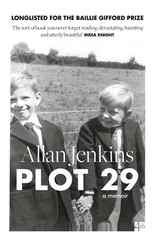‘Well, fuck off back there, you big ignorant gobshite! This is my town and I won’t have some culchie in size twelve boots frightening my child.’
The policeman departed soon after, followed by a hail of abuse.
Breda’s was a house of relentless noise, a great deal of which was laughter. One of her daily trials was raising her sons from their beds and hunting them out to school. None of them liked the Christian Brothers School in Finglas; all waited for the day when they could quit and go to work, and each morning there was the same vaudeville: Breda would stand at the bottom of the stairs and roar at her sleeping boys above. When this failed to rouse them she would run upstairs and shake them out of bed. She would then go back downstairs to prepare the breakfast and school lunches. The boys merely continued to sleep where they had fallen, or crept into another bed.
I have fragmented memories of that time. I remember walking with Breda to the shops on a misty morning in winter and seeing the horses of travellers grazing on the green, the owners camped nearby under plastic sheeting and their red-haired children running out to look at us. We called them ‘the tinkers’. My father said they lost their land when Cromwell drove the Irish into Connaught.
There were other mornings, standing in the hallway of Breda’s house, when her husband Liam would stop by with a trayful of cakes from the bakery where he worked. ‘Pick any one you want,’ he would say. There were sugary doughnuts, chocolate éclairs, custard slices and thick wedges of dark cake called ‘Donkey’s Gur’. The back of Liam’s van smelled of warm bread: turnover and batch loaves, fresh from the baker in Cabra. As he drove away other kids would run after the van. ‘Mr Breadman. Mr Breadman. Gi’s a cake, will ya.’ And I remember Breda’s happiness on a weekend night, when the work of feeding and cleaning was done, and she would sit in the small front room and tell stories about her father fighting the Nazis, before switching into song: The Roses are Blooming in Picardy …
My mother told me stories about our neighbours.
Near to the shops lived a family I will call the Murphys. Joe worked in a factory and Mary cleaned offices in the city. Such work involved leaving home every morning shortly after six and rushing home in the late afternoon in time to make dinner for the family. Mary spent her life on her knees, polishing the long floors of the Royal College of Surgeons for pitiful wages. In Mary’s case, cooking was a problem. She was a devoted mother but her ignorance of all but the basic rudiments of cooking shocked Breda. There was much resort to tins and packets in Mary’s house. So Breda Thunder took it upon herself to teach Mary how to prepare roast chicken and potatoes for Sunday lunch.
The following Monday, Mary knocked on Breda’s door. The chicken and spuds had been a triumph. Mary described in detail how the chicken had been divided:
‘You know, I had a leg for Joe, a leg for Peter and a leg for myself and for Martina, there was a leg for Mick too when he came in from work, and there was even one left over to give the dog in his bowl.’
Astonished at the profusion of legs on one chicken Breda declared: ‘Are you sure it was a chicken and not a fuckin’ centipede you cooked!’
As I grew older other neighbours and their children entered my field of vision. There was a woman called Sadie Doyle who lived on the opposite side of the street. Sadie wore a fur coat and her blonde hair in a beehive. She had a family of seven crammed into a tiny council house. When she came into Breda’s house the boys would start singing a Beatles song: Sexy Sadie, what have you done? You made a fool of everyone… Sadie would make to clip them on the ear and then burst out laughing.
Like Mary and Joe and Breda and Liam, Sadie worked all hours to keep her family fed and clothed. Sadie and Breda were much less romantic in their ideas about men than my mother. Both were immensely protective of Maura. They saw her as a lost innocent who had blundered into the world of marginal choices and needed protection if she was going to survive. My mother spoke with a different accent and was clearly a child of the Irish middle classes. But Breda and Sadie were immune to resentment or class bitterness. When she came to them Maura was thin and haggard, strained with the effort of caring for the man she married and her growing family. They saw a young woman in trouble and responded in the only way they knew.
With Breda acting as childminder my mother was able to go to work. She found a job on the other side of the city at a placed called Clontarf, an old, established suburb on the shores of Dublin Bay. ‘Clontarf is where Brian Boru was killed by the Danes when the Vikings invaded Ireland,’ she told me. A big Dane called Broder came into the King’s tent and murdered him.
My mother taught English and French to boys who had no interest in either. But she was alive in a way that these boys had never known a teacher to be. She told them stories and helped them to find something they did not know they had: their better nature. The headmaster was a strict man, a man of his time and place. I met him once and he surprised me, after what I had heard about him, by taking me to the basement and opening the door onto a room where he kept a huge train set. The room was dusty, smelled of chalk and ink, and the train sped around and around, through tunnels and past mountains, like the train to my grandmother’s house in Cork. I imagined him standing there after the school had emptied watching the endless journey of his tiny locomotives, a hard lonely prisoner of Ireland in the 1960s.
Now that my mother had a job there was regular money. She was saving every month, putting by a little into a special account because she dreamed of owning a house of her own. For my mother, coming from the comfortable world she did, it was not unusual to aspire to ownership. But for her neighbours, Breda and Liam, the money they were busy saving represented an unimaginable social change. In the old Ireland people like them didn’t get to own houses. They went from generation to generation in crumbling tenements or lived in hope of a flat in one of the new tower blocks. Liam Thunder had other ideas.
Finglas was getting tougher all the time. If he kept his sons there, there was a good chance at least one of them would get into trouble. Squad cars already called at other houses in the area. The police were becoming the enemy. In the years to come parts of Finglas would become notorious for drug dealing, as cheap heroin flooded into Dublin and boys from the area would become addicts, pushers and gangsters.
My mother kept saving. I think there may also have been part of her which believed that a move might somehow change my father. Once she had saved the deposit she started hunting for houses, far away in Terenure on the south side of the city. She found a handsome redbrick on a quiet street named Ashfield Park and we moved there in the middle of the 1960s.
After Casement Green this house seemed huge to me: downstairs it had a living room, a dining room, a breakfast room and a kitchen; upstairs there were four bedrooms. I had one all to myself. Outside the room in which my parents slept there was a huge willow tree which swayed back and forth whenever the wind blew. At first it frightened me, and then my father told me that the willow was a lucky tree.
Shortly after we moved in, Breda Thunder and the boys came to visit. I remember Breda wearing a black fur coat and filling our new dining room with laughter, astonished like us at the size of the place. Not long afterwards she and Liam and the boys left Finglas too for a bright new home of their own on the western approaches to the city. For a while it looked as if all our luck was turning.
Читать дальше












